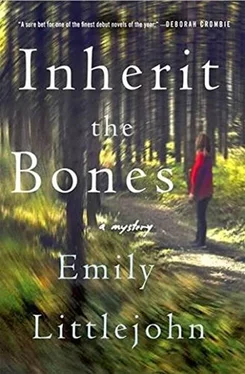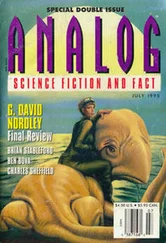
Emily Littlejohn
Inherit the Bones
A book in the Detective Gemma Monroe series, 2016
For my parents, who made everything possible
This book would not have been written without the help of a great many people. David Neal and Ana Cabrales were my earliest readers, and their hunger for more chapters propelled me forward when I needed it most. Patricia Hackett, William Lindenmuth, Kelda Neely, and Kathy Littlejohn offered suggestions that strengthened the story. Pam Ahearn and Elizabeth Lacks-you have truly changed my life. Don Sells, you told me once that you could see me as a writer. Here’s to offhand comments on cold Oxford days. Mom, Carrie, Kathy, Matt, Jim, and Jill, your support means the world to me. And to my dear husband, Christopher, you are simply the best. I love you more.
In my dreams, the dead can speak. They call to me, in whispers and murmurs, and I greet them by name, like old friends. Tommy and little Andrew. They seem to smile in return but this is merely my imagination; I have no way of knowing what their smiles looked like. I’ve seen photographs, faded black-and-white images, but the pictures are out of focus, and a smile is more than the hazy marriage of lips and teeth.
A smile is the dancing in the eyes, the joy in the face.
When I wake, exquisite sadness overwhelms me for these two souls, whose lives ended in violence thirty years ago. I rise and begin my day, and still, I hear them whisper.
We are the dead , they chant. Do not forget us .
I knelt at the clown’s head. His grin, a scarlet smear, stretched across greasy stage makeup and then angled up toward a wig, electric orange and kinky. He lay on his back, hands at his sides, palms open. Under the portable LED lights we’d set up, the reds and yellows in his checkered shirt took on a fiery glow, as though the fabric was illuminated from somewhere deep inside the boy’s chest.
Inside the tent, the air was still and smelled of stale popcorn and manure and blood. Shadows and gloom filled areas in the space that the LED lights could not reach, would not reach, without a powerful generator.
Outside the tent, it was a hot, dry August day. We’d seen ninety-five on the thermometer before noon. Over the Rockies, clouds like cotton balls dotted the blue skies, cream-colored puffs that teased our parched forests. A few miles from the fairgrounds, popular trails were crawling with hikers and dogs, their enthusiastic paces slowed only by toddling children and overindulgent parents, all oblivious to the newest spectacle at the Fellini Brothers’ Circus.
Heaven outside.
Hell inside.
“Coulrophobia.”
I squinted up. Chief of Police Angel Chavez stood a few feet from the body, careful to keep his loafers out of the blood that had pooled and thickened beneath the clown. The shoes were brown and Italian and out of place among the horseshit and dust.
The chief looked down at me and sighed.
“Fear of clowns. Coulrophobia. Lisa lost her fourth-grade spelling bee on that word. I had to listen to her recite it for weeks after. C-O-U-L-R-O-P-H-O-B-I-A,” Chavez said.
I smiled. “How’d she spell it?”
“Two o ’s instead of the o and u . Who’s the clown, Gemma?”
“His name is Reed Tolliver. The general manager for Fellini’s, a guy named Joseph Fatone, gave us the ID. Caucasian male, nineteen years old. The injury begins here,” I said, and flashed my penlight at the gaping tear under the clown’s left ear.
The wound traversed the poor kid’s entire throat, carving a jagged canyon across what had once been a smooth surface of flesh. Reed Tolliver’s eyes were open and when the beam from my penlight caught them, I was struck again by their icy blue color. An arctic shade so pale it looked unreal, like those contact lenses people wear at Halloween.
Chief Chavez sighed again. “Other than the woman who found him, has anyone else been in?”
I stood, twisted to the side and cracked my spine, and shook my head.
A fairground worker had discovered the body two hours earlier. Searching for a box of raffle tickets, she entered the tented storage space and moved through a dimly lit maze of junk and trash: ropes and canvases, signs, nails, empty containers, wadded up fast-food wrappers, crushed soda and beer cans. She found the tickets, turned to leave, and saw the body.
I arrived ten minutes after the call came in; the crime scene techs fifteen minutes later.
Chavez rubbed at the stubble on his chin. These days, the tiny hairs were coming in more gray than black. “What else do we know?”
Fatone, the general manager, had given me little information. He got sick after identifying the body, throwing up all over the front of his polo shirt. I couldn’t handle the smell of the vomit and I let him leave the tent without a full interview.
“Tolliver shows up in Cincinnati two years ago, begging for a job, says he has theater experience. Fatone claims he never takes on kids, but Tolliver had ID and was a few months shy of his eighteenth birthday, and they’d just had a clown quit, so…”
“Bullshit. Half these employees are probably underage,” Chavez replied.
I thought about the young men and women milling about outside the tent and decided the chief was right. Most of them didn’t look a day over eighteen. It would be easy for a street kid to fall in with the troupe and find a place for himself. And it would be even easier for the circus to pay a kid less than what they’d pay a migrant worker.
It was what you might call a win-win situation.
“Any family?” Chavez asked.
I shrugged. “Fatone was under the impression Tolliver was a foster kid. At least, he says, there was never any mention of family.”
The chief squatted by the clown’s feet and studied the body. When he stood, his knees creaked and popped. “Jesus. Wait until the press gets word. And the mayor… he’s going to be in my ass tighter than Santa Claus in a damn chimney.”
I winced at the image.
“Doesn’t Bellington have enough to do without getting in our way? You can’t tell me he’s got room on his plate, between chemo treatments, running this town, and keeping his fingers in the pie that is Washington. Christ, he nearly ran the whole operation on that home invasion case a few months back. And that was before he got sick.”
Chavez pointed an index finger at my face and gave me the look. “You just remember, the man’s got eyes and ears all over this valley. The murder of this kid, here at our fairgrounds? It just became your only priority. This sort of thing doesn’t happen here.”
“Not recently, at least,” I said under my breath.
I was pleased to be the lead on this, but I didn’t relish the thought of the mayor breathing down my neck every step of the way. Terence Bellington had run his campaign on a sort of idealized return to the 1950s, where family dinners are the norm and neighbors watch out for one another. He thought if things were right with your family then that would translate to the community at large.
Family was everything to him. It was like the Sopranos, or the Medicis, without all the blood and art. I found the man out of touch with reality. In this day and age, the aftershocks of the Great Recession were still being felt. Families were lucky to put dinner on the table and have homes next door with neighbors still in them.
But I kept my mouth shut. Chavez and the mayor had a long history, of which I knew just enough to not want to know more.
Читать дальше


![Лаура Бренз - Потомственная ведьма[Inherit the Witch]](/books/79609/laura-brenz-potomstvennaya-vedma-inherit-the-witch-thumb.webp)










